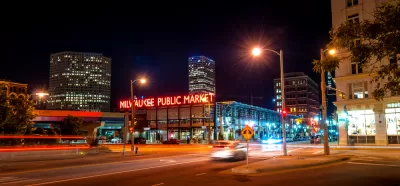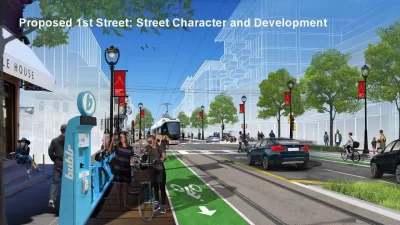Citing the psychological impact of doughnuts and the American Red Cross, one opinion writer questions the wisdom of a recent sponsorship deal.

Milwaukee recently announced that, for the first year of operation, there will be no charge to ride the streetcar line now known as “The Hop.”
The arrangement was made possible the Potawatomi Hotel & Casino, which is paying $10 million for 12 years of operation in exchange for naming rights.
It’s one way to increase ridership on a new system, but at Urban Milwaukee, Jay Bullock writes, “free rides for a year is a terrible, terrible idea.”
Bullock attributes his opinion to the American Red Cross, free doughnuts, and an economic concept known as “categorical change,” which is psychologically distinct from a change in price, at least in the minds of consumers.
“In World War II, the Red Cross offered free coffee and donuts to American soldiers overseas. They charged soldiers from other Allied nations a quarter a donut, though, so there was some animosity as you might expect. The War Department kindly asked the Red Cross to charge American soldiers, too, and the soldiers flipped out.”
Or, as one economist writes, “It turns out that people typically overreact to price or income changes within an expenditure category.”
The city is likely anticipating decreased ridership after the free year, but, asks Bullock, “[W]hat if it’s not some drop-off, but a deep, deep dive? With your riders now super angry that you started charging?”
The author, in the end, raises a very modern example.
“Imagine, for example, if Facebook suddenly announced it would cost $10 a month. Well, I tell you what, I bet MySpace would come roaring back!”
FULL STORY: Don’t Make Streetcar Rides Free

Alabama: Trump Terminates Settlements for Black Communities Harmed By Raw Sewage
Trump deemed the landmark civil rights agreement “illegal DEI and environmental justice policy.”

Planetizen Federal Action Tracker
A weekly monitor of how Trump’s orders and actions are impacting planners and planning in America.

The 120 Year Old Tiny Home Villages That Sheltered San Francisco’s Earthquake Refugees
More than a century ago, San Francisco mobilized to house thousands of residents displaced by the 1906 earthquake. Could their strategy offer a model for the present?

In Both Crashes and Crime, Public Transportation is Far Safer than Driving
Contrary to popular assumptions, public transportation has far lower crash and crime rates than automobile travel. For safer communities, improve and encourage transit travel.

Report: Zoning Reforms Should Complement Nashville’s Ambitious Transit Plan
Without reform, restrictive zoning codes will limit the impact of the city’s planned transit expansion and could exclude some of the residents who depend on transit the most.

Judge Orders Release of Frozen IRA, IIJA Funding
The decision is a victory for environmental groups who charged that freezing funds for critical infrastructure and disaster response programs caused “real and irreparable harm” to communities.
Urban Design for Planners 1: Software Tools
This six-course series explores essential urban design concepts using open source software and equips planners with the tools they need to participate fully in the urban design process.
Planning for Universal Design
Learn the tools for implementing Universal Design in planning regulations.
Clanton & Associates, Inc.
Jessamine County Fiscal Court
Institute for Housing and Urban Development Studies (IHS)
City of Grandview
Harvard GSD Executive Education
Toledo-Lucas County Plan Commissions
Salt Lake City
NYU Wagner Graduate School of Public Service




























